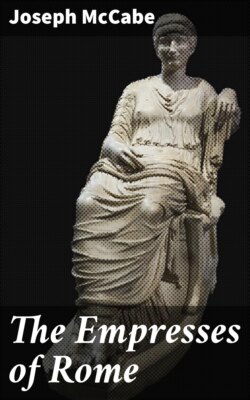Читать книгу The Empresses of Rome - Joseph McCabe - Страница 6
На сайте Литреса книга снята с продажи.
Footnote
ОглавлениеTable of Contents
For the guidance of the general reader it is advisable to add a few words on the Latin authorities, whom we now constantly quote. Tacitus, the chief source of our knowledge down to the year 70 A.D., is not only weakened as an historian by the very strength of his morality, but he has too lightly followed the memoirs in which the later Agrippina defamed the rival Imperial family. Suetonius, who takes us as far as Domitian, is no less honest, but he has too genial and indulgent a love of anecdotes to discard any on the mere ground that they are untrue or improbable. Dio Cassius, who covers the first two centuries, is usually described as malignant; but one may question if he does more than indulge still further the same amiable preference of piquancy to truth. The “Historia Augusta,” which is our chief authority for the greater part of the Empresses and the richest source of scandal, has been much and profitably discussed since Gibbon placed such reliance on it. It is now thought by some experts that the original writers of this series of biographical sketches of the Roman Emperors lived at the beginning of the third century, and had a comparatively sober standard of work. Toward the close of the third, or beginning of the fourth, century the work was written afresh by the group of less scrupulous writers whose names, or pseudonyms, actually stand at the head of its chapters. But a still later writer once more recast the work, and lowered its authority. He wrote frankly from the point of view of the piquant anecdotist, omitting much that would interest only the prosy student of exact facts, and filling up the vacant space with such faint legends of Imperial vice or folly as still, in his time, lingered without the pale of history, or arose in the field of romance. The question is fully discussed by Otto Schultz, “Leben des Kaisers Hadrian” (1905), and Professor Kornemann, “Kaiser Hadrian” (1906).
